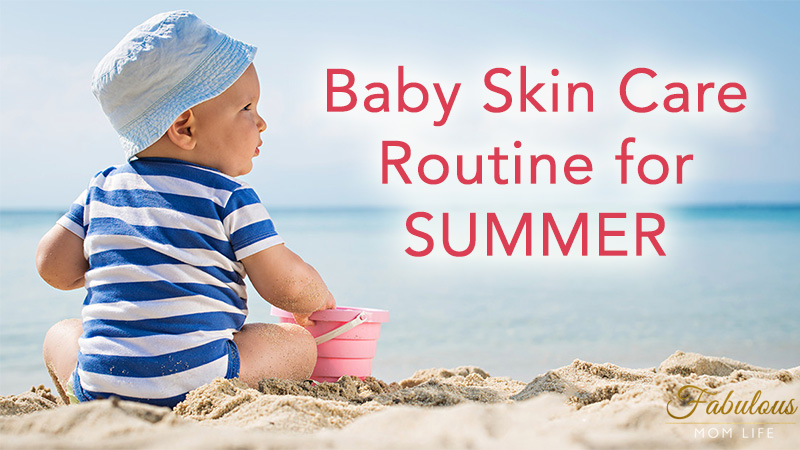
Baby Skin Care in Summer: A Comprehensive Guide for Parents
Summertime brings warm weather and plenty of outdoor activities, but it also poses unique challenges for baby skin care. The sun’s intense rays, heat, and humidity can cause irritation, dryness, and even sunburn. As a parent, it’s crucial to understand the specific needs of your baby’s skin during this season and implement a comprehensive care routine to keep it healthy and protected.
Understanding Baby Skin
Baby skin is delicate and differs significantly from adult skin. It is thinner, more permeable, and has a weaker protective barrier. This makes it more susceptible to environmental factors, including the sun’s UV rays and pollutants. Additionally, babies have a higher surface area-to-volume ratio, meaning they absorb more substances through their skin.
Summer Skin Concerns
During the summer months, babies are at risk for several skin concerns, including:
- Sunburn: Babies’ skin is highly sensitive to the sun’s UV rays, and even a short exposure can cause sunburn. Sunburn can lead to redness, pain, blistering, and long-term skin damage.
- Heat rash: Heat rash, also known as prickly heat, occurs when sweat ducts become blocked, causing small, red bumps on the skin. It is common in areas where the skin is covered by clothing or diapers.
- Dryness: Summer heat and humidity can draw moisture from the skin, leading to dryness and irritation. Dry skin can become flaky, itchy, and uncomfortable.
- Eczema: Eczema is a common skin condition that causes dry, itchy, and inflamed skin. It can be aggravated by heat, sweat, and certain allergens.
Comprehensive Summer Skin Care Routine
To protect and care for your baby’s skin during the summer, follow these comprehensive steps:
1. Sun Protection:
- Avoid peak sun hours: Keep your baby out of direct sunlight between 10 am and 4 pm, when the sun’s rays are strongest.
- Use sunscreen: Apply a broad-spectrum sunscreen with an SPF of 30 or higher to all exposed skin, including the face, ears, hands, and feet. Reapply every two hours or more often if swimming or sweating.
- Choose baby-specific sunscreen: Look for sunscreens specifically formulated for babies, which are hypoallergenic and free of fragrances and dyes.
- Cover up: Use hats, sunglasses, and lightweight, breathable clothing to provide additional sun protection.
2. Hydration:
- Bathe regularly: Give your baby a lukewarm bath once or twice a day to remove dirt, sweat, and sunscreen. Use a gentle, fragrance-free baby wash.
- Moisturize: Apply a fragrance-free, hypoallergenic moisturizer to your baby’s skin after bathing and throughout the day as needed. Look for moisturizers containing ceramides, which help strengthen the skin’s protective barrier.
- Avoid harsh soaps and detergents: Use mild, fragrance-free soaps and detergents to wash your baby’s clothes and bedding.
3. Heat Management:
- Dress your baby in lightweight, breathable fabrics: Choose cotton, linen, or bamboo clothing that allows air to circulate and prevents overheating.
- Avoid overdressing: Don’t bundle your baby up too much, as this can lead to heat rash and discomfort.
- Keep your baby cool: Use a fan or air conditioner to keep the room temperature comfortable. Avoid exposing your baby to extreme heat or humidity.
4. Diaper Care:
- Change diapers frequently: Change your baby’s diaper as soon as it becomes wet or soiled to prevent diaper rash.
- Use breathable diapers: Choose diapers that allow air to circulate, such as those made with natural materials like bamboo or cotton.
- Apply diaper cream: Apply a zinc oxide-based diaper cream to your baby’s diaper area at each diaper change to protect against diaper rash.
5. Other Tips:
- Avoid harsh chemicals: Avoid using harsh chemicals, such as bleach or chlorine, on your baby’s skin or clothing.
- Keep your baby hydrated: Offer your baby plenty of fluids, such as breast milk, formula, or water, to prevent dehydration.
- Consult a dermatologist: If your baby develops any skin concerns that do not improve with home care, consult a dermatologist for professional advice.
Conclusion
Baby skin care in summer requires a comprehensive approach that addresses the unique challenges posed by the season. By following the steps outlined in this guide, you can protect your baby’s skin from sun damage, heat rash, dryness, and other summer-related concerns. Remember to prioritize sun protection, hydration, heat management, and proper diaper care to keep your baby’s skin healthy, comfortable, and glowing all summer long.
